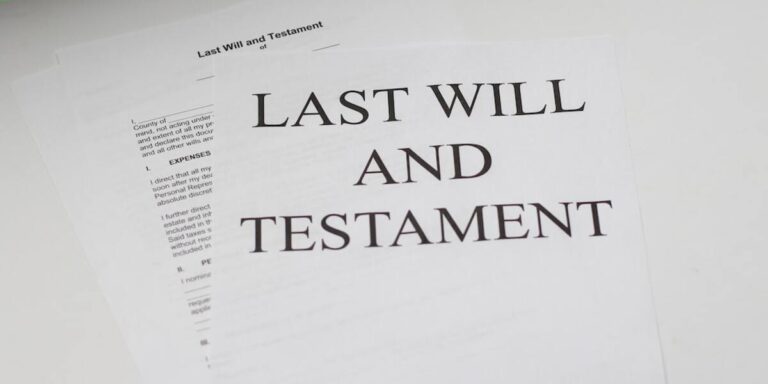What do you do when someone dies without a will in NY?
When someone dies without a will in New York, it can be difficult to navigate the state’s inheritance laws. Knowing what NY Inheritance Laws No Will require is essential for ensuring that an estate is properly distributed according to law. A probate lawyer can help guide you through this process and provide advice on how best to handle your situation.
The death of a loved one always brings with it emotional distress, but when there isn’t a valid last will or testament left behind by the deceased individual, then matters become even more complicated as far as who gets what from their estate goes. In such cases, understanding NY Inheritance Laws No Will becomes extremely important so that all parties involved are aware of their rights and responsibilities under these regulations. This blog post aims at providing some insight into how estates should be handled in situations where no valid Last Will exists within the State of New York; we’ll also discuss ways in which hiring an experienced probate attorney may prove beneficial during this time period
Understanding New York Inheritance Laws When There is No Will
When someone dies without a will, the laws of intestacy in New York come into play. Intestacy is when an individual passes away and does not have any estate planning documents such as a Last Will & Testament or Living Trust. This means that the state decides how to distribute their assets according to its own rules instead of what was intended by the deceased person. In this situation, it’s important for family members and other interested parties to understand New York inheritance laws so they can make sure all property is distributed correctly after death.
A probate lawyer can help families navigate these complex legal issues related to intestate succession in order ensure proper distribution of assets based on applicable law and protect against potential disputes among heirs regarding who should receive which asset(s). A qualified attorney also has experience dealing with financial institutions like banks or brokerage firms where inherited funds may be held, helping speed up access for beneficiaries during difficult times following loss of a loved one. It’s critical for those involved with administering an estate under these circumstances consult knowledgeable counsel about navigating complicated procedures associated with distributing property from estates without wills present .
Exploring Your Options After the Death of a Loved One Without a Will in NY
When a loved one passes away without leaving behind a will, the process of determining who inherits their assets can be complicated and time-consuming. In New York State, inheritance laws are governed by state statutes that determine how property is distributed when someone dies intestate (without having made a valid will). These rules apply to all individuals regardless of marital status or whether they have children.
The distribution of an estate in such cases depends on several factors including: if there is surviving spouse; any living descendants; parents and siblings; grandparents and other relatives. It’s important to note that these decisions must take into account both real estate holdings as well as personal possessions like cars, jewelry etc., which may require appraisals before being allocated among heirs. A probate lawyer can help you navigate through this complex legal system so that your rights are protected during the process while ensuring timely resolution for all parties involved in the case. They understand what documents need to be filed with court clerks along with specific deadlines associated with each step throughout proceedings – ultimately helping ensure swift closure for those affected by loss due to death without wills .
The Benefits of Consulting with an Experienced Probate Lawyer for No-Will Cases in NY
When it comes to navigating the complexities of New York inheritance laws without a will, consulting with an experienced probate lawyer can be invaluable. In such cases, having access to legal counsel who is knowledgeable about all aspects of estate planning and administration law in NY state can provide peace-of-mind that your rights are being properly protected during this difficult time.
A qualified attorney specializing in no-will estates has experience dealing with the court system as well as working out any disputes between family members or other parties involved regarding how assets should be distributed among heirs. They also have expertise when it comes to ensuring taxes associated with inherited property are paid on time and accurately filed according to IRS regulations so you don’t incur unnecessary penalties or fees down the road. Additionally, they understand what documents need filing for transferring ownership titles correctly and timely which helps avoid costly delays later on if there were issues missed initially due to lack of knowledge concerning proper protocol procedures within New York State guidelines governing inheritances without wills. Having someone familiar with these matters by your side gives assurance that everything is taken care off quickly while protecting everyone’s interests throughout the process
Navigating Complexities Surrounding Intestate Succession and Estate Distribution in New York
The complexities of New York inheritance laws without a will can be overwhelming for families dealing with the death of a loved one. In such cases, intestate succession applies and state law determines who is entitled to receive property from an estate. This process may include multiple parties that have legal rights to portions or all of the decedent’s assets, which must then be distributed accordingly.
In order to ensure that this complex process goes smoothly and in accordance with applicable regulations, it is important for those involved in administering an estate under these circumstances to consult experienced probate lawyers familiar with New York inheritance laws no will situations. A qualified attorney can provide guidance on how best handle any disputes between heirs as well as advise on proper procedures when filing documents related to settling estates where there was not previously a validly executed last will and testament present at time of death. With their help you can rest assured knowing your family’s interests are being protected throughout every step along the way towards finalizing distributions according to what would otherwise be determined by intestacy rules set forth by NY State Law
Frequently Asked Question
-
Do you pay taxes on inheritance in New York?
-
What do you do when someone dies without a will in NY?
-
What is the order of inheritance in NY?
-
Who gets paid first from an estate in NY?
-
How long does probate take in NY with no will?
-
What is an absolutely entitled beneficiary?
-
Who is the one family member in NY who Cannot be disinherited?
-
What do you pay when you inherit money?
-
What is the legal order of next of kin in New York?
New York’s estate tax rates range from 3.06% up to 16%. This tax is applicable to estates exceeding $6.11million in 2022. It will increase to $6.58 million by 2023.
New York State law has created an estate administration framework that allows property to be passed on when someone dies without intestate. The closest relative (the deceased) must file an estate administration petition instead of filing for probate. This usually falls on the spouse, children or parents of the deceased.
Adopted children inherit the same rights as biological children. Foster children or stepchildren cannot inherit the estate unless legally adopted. The Decedent’s children will pass on the inheritance to their grandchildren. Only grandchildren who die before their parents (the child of the Decedent) will be able to inherit.
If the estate has insufficient assets to cover the debts, priority is given for funeral expenses and administration of the estate.
If there are estate tax returns, the probate process can take anywhere from 18 to 3 years. The closing letter of the tax authorities may be required before the estate administrator can distribute the estate to beneficiaries. The letter could be delayed for several months, or even years.
Absolute entitlement refers to a concept relevant within the framework of capital gains tax provisions. A trustee is considered the appropriate owner of CGT assets unless there are beneficiaries who have absolute rights to it.
New York law prohibits a spouse from being disinherited. The will may not specify that the spouse is to receive the property of the deceased, but the surviving spouse often has the right to an option share.
California does not have an inheritance or state-level estate tax. California residents do not have to pay an inheritance tax on money they inherit from someone who has died. Only six states have an inheritance tax for people who inherit money as of 2023.
New York Intestate Succession – Parents and siblings After children and spouses, grandparents are next. They will be the descendants of the parents who have died. Parents inherit all if one or both parents of the deceased survive their deaths, even if there are no children or spouses.
Conclusion
The death of a loved one is never easy, but the lack of a will can make it even more difficult. Knowing what to do in this situation can be overwhelming and confusing. It’s important to remember that New York has specific laws regarding inheritance when there isn’t a will present, so researching these laws before making any decisions is essential. When looking for an attorney who specializes in probate law related to inheritances without wills, always look for trusted links and reviews on our website or other reliable sources – doing your research ahead of time could save you from potential legal headaches down the road!







